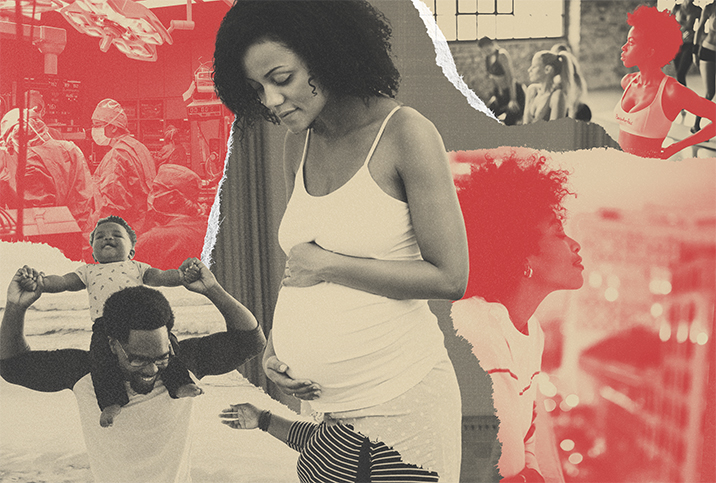For Immigrant Women, Access to Reproductive Care Is Its Own Challenge

Reproductive care access for immigrants was sparse before the pandemic. Then, COVID-19 arrived, pummeling through immigrant communities of color at disproportionate rates compared to white United States–born citizens. A July 2020 study noted that high rates of COVID-19-associated deaths in minority populations was likely due to an "increased prevalence of comorbid conditions as a result of unequal socioeconomic factors and inadequate access to timely healthcare."
According to research by the Guttmacher Institute, immigrants account for 17 percent of reproductive-aged women in the United States and 23 percent of new births. These statistics indicate immigrant women are a major presence in the U.S., begging a closer look at why immigrant women face obstacles in obtaining sexual and reproductive care, which can include family planning, STI testing, preventive screenings, abortion services, contraception or pre- and postnatal care.
One Guttmacher study found only half of immigrant women at risk of an unintended pregnancy had received contraceptive care in the previous year, compared with two-thirds of U.S.-born women. Another found that immigrants are less likely to use a contraceptive method that may be driven by preference, upfront expenses or need for a clinician.
Immigrant women are also less likely to seek preventative care like Pap smears and mammograms. "For many women with low incomes, OB-GYN appointments are their only regular visit to the doctor and an entry point for a range of preventive care, from checking blood pressure levels to screening for breast and cervical cancer," said Lucy Ceballos Félix, associate director of Texas Field and Advocacy at the National Latina Institute for Reproductive Justice.
Access to healthcare
One major barrier to basic healthcare comes in Medicaid restrictions. "Currently, im/migrants with legal status must wait five years to access federal Medicaid coverage," Félix explained. And even with federal benefits, there are additional eligibility restrictions.
Obtaining care becomes virtually nonexistent with no access to federal Medicaid benefits if you are undocumented. "They [undocumented immigrants] are not even allowed to purchase private health coverage on the Affordable Care Act (ACA) Marketplace," Félix said. The same goes for refugees and asylum seekers.
Immigrants also face limited access to employer-sponsored insurance. The Kaiser Family Foundation's summarization of the issue attributes this to the industries many noncitizens work in—they are less likely to offer coverage. Félix echoed this sentiment. "Due to occupational segregation, im/migrants and people of color often work in industries that are undervalued, underpaid, lack basic worker protections, and offer no benefits," she said.
'[Undocumented immigrants] are not even allowed to purchase private health coverage on the Affordable Care Act (ACA) Marketplace.'
There are limited programs in place to address this disparity. According to Sylvia Castillo, associate director, Government and Community Affairs at Essential Access, California offers programs that provide coverage for sexual and reproductive health services to low-income, uninsured people in the state, regardless of their immigration status.
Two of these programs are Family PACT and Medi-Cal. Family PACT covers family planning-related care, birth control and STI testing. Medi-Cal (which covers some pregnant undocumented immigrants if they meet the income requirements) covers abortion care, birth control services and postpartum care.
California is the first and only state to offer access to care for undocumented immigrants.
Fear of deportation as a barrier to care
It's not just federal and state policy that bars access to reproductive care. Guttmacher noted the unwavering immigration raids throughout the pandemic as a potential deterrent for those seeking reproductive care services.
"Fear of deportation and family separation has had a chilling effect on im/migrant communities and has forced many Latinas/xs to avoid reproductive healthcare altogether," Félix said.
Fear of deportation directly impacts feeling safe enough to show up for an appointment. "In states like Texas, it's common to see Immigration and Customs Enforcement (ICE) officers at clinics and hospitals," Félix said. "Our activists have received calls, heard stories, and spoken with people in the Lower Rio Grande Valley—the border area I call home—where people are afraid to go to their medical appointments due to the presence of Border Patrol along their route to the doctor."
And if you're pregnant and too afraid to attend necessary appointments, the outcomes can be dire. Pregnant people "tend to skip prenatal appointments and many wait until they are in labor to go to the doctor," Félix said. "As a result, life-threatening conditions such as preeclampsia aren't diagnosed until patients experience seizures."
'In states like Texas, it's common to see Immigration and Customs Enforcement (ICE) officers at clinics and hospitals.'
Félix lists time and money as two contributors that impact abortion care access for Latinas/xs who live in states with abortion restrictions, like Texas. But for immigrants, there is an added layer of concern traveling out of state for abortion due to checkpoints.
"Checkpoints set up by U.S. Customs and Border Patrol that surround the southern border region of Texas prevent people without documentation from crossing to another county, let alone another state, to seek abortion care," Félix explained.
Recent policies reinforced deportation fears for immigrants. In 2019, U.S. Citizenship and Immigration Services announced a rule that made it so legal immigrants who received public benefits (such as Medicaid and public housing) for longer than one year may be classified as a "public charge" and become ineligible for permanent residency.
"Unfortunately, the Trump Administration's Public Charge rule had a chilling effect among immigrant communities that deterred many from accessing essential health care, including reproductive health services, out of fear that using the services would impact their immigration status," Castillo said.
While the rule is no longer in effect as of 2020, the fear still lingers in immigrant communities, mixed-status families and households, and lawfully present immigrants "who feared that their personal use of public health programs would affect their family member's future ability to gain documented status," Castillo explained.
Addressing access disparities
"Work remains to undo the damage sowed during the previous presidential administration and continue raising awareness among immigrant communities about their rights to access confidential and timely access to sexual and reproductive health care," Castillo said.
Advocates of addressing access disparities say improved policies can help bridge access gaps. Improved policies may take administrative barriers into account, such as providing a social security number. Félix advocates for The HEAL for Immigrant Families Act which would remove status restrictions in obtaining healthcare.
"Black, Indigenous, people of color, and im/migrants face higher rates of poverty and less health insurance coverage due to systemic racism and xenophobia and are the least likely to be able to afford time off work, travel long distances, or pay out of pocket for care," Félix explained. "We need to provide health coverage for our im/migrant communities so they can live with dignity and thrive. Access to healthcare is a human right, pure and simple."



















Commentary